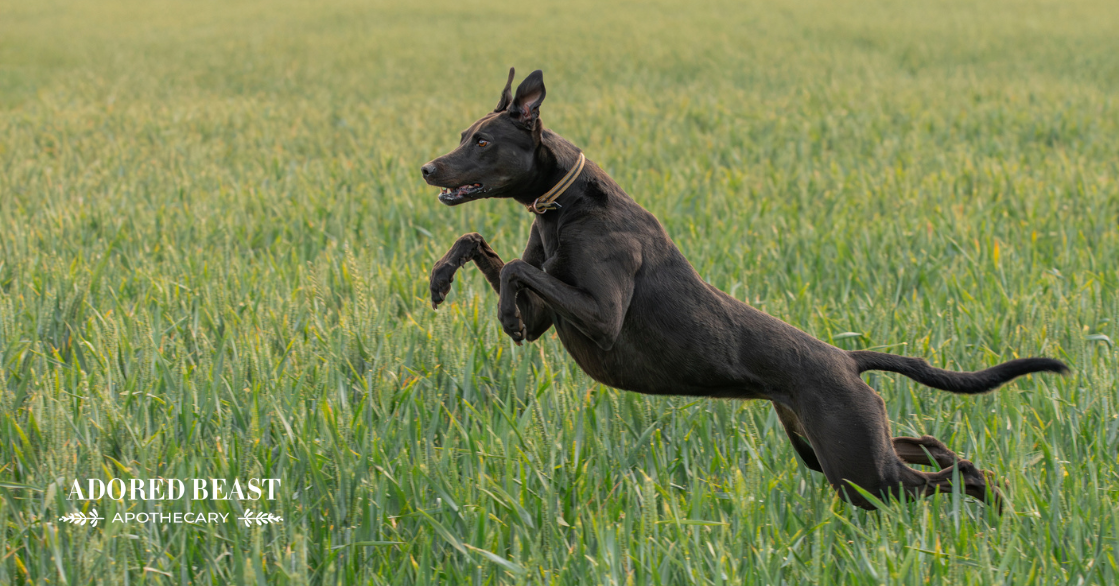Tea is one of my favourite things… sitting down at night with a warm cup of tea is so soothing.
And green tea is definitely on the list.
But what about green tea for dogs? There are several different types of tea that I share with my pups – chamomile being one of my favourites, for a variety of reasons – but is green tea on that list as well?
The Benefits of Green Tea for Dogs
Green tea is a type of tea made from the camellia sinensis plant. Black and oolong teas both come from the same plant, but are prepared using different methods. To make green tea, leaves from the plant are steamed, pan fried, and dried. It’s made this way to halt oxidation – that’s why the leaves stay green! Once they’ve oxidized, they turn black, hence black tea.
Green tea has many different benefits. In fact, it is often considered to be one of the healthiest beverages on the planet!
Green tea is widely known for its antioxidant properties. It contains a type of polyphenol called catechin, which is an antioxidant that helps prevent cell damage, among other things. Antioxidants help fight free radicals, which lead to oxidative stress, which in turn can lead to many different diseases, including cancer.
These catechins have also been shown to function as anti-inflammatory and anti-cancer agents. Additionally, there’s research to show that these antioxidants can be beneficial for promoting heart, liver, and brain health.
It’s an excellent source of vitamins A, D, E, C, B, B5, H, and K, manganese and other beneficial minerals such as zinc, chromium, and selenium.
Research also shows that green tea has antibacterial, antimicrobial, and anti-viral properties, making it useful for external use as well as internal.
Are There Any Risks?
One of things that pet parents worry about with green tea for dogs is the caffeine.
Caffeine can be toxic to our canine friends, so it’s a very real concern.
An 8-ounce (230-ml) cup of green tea contains between 30 and 50mg of caffeine. The recommended maximum amount of caffeine per day for people is 400 mg. That’s the equivalent to around 8 cups of green tea. It contains less caffeine than coffee, but still…
Because of this, we only recommend decaffeinated green tea.
But there’s one other important element to the caffeine issue… the extraction method used.
Green tea can be extracted in different ways – chemical-based and water-based.
If chemical methods are used to decaffeinate the tea, they’ll strip out more of those health benefits. Plus, there’s the chance that some of those chemicals remain in the final product – no thank you!
In contrast, if water-based methods are used, much of those benefits remain intact. So, just do your research. Read into a company’s processing methods to see which one is used. Don’t be afraid to call the company and ask questions about their picking and processing methods.
Additionally, because tea accumulates heavy metals and other toxins from the soil and water, you always want to look for organic green tea to minimize exposure. Look for really clean growing conditions to help ensure the tea you’re using, both for your animal and yourself, is as clean as it can be.
Another concern is contraindications. Some of the contraindications for drinking green tea in humans includes kidney disease, stomach or intestinal ulcers, heart disease, insomnia, glaucoma, and high blood pressure. While there aren’t any studies that examine these in dogs specifically, it does make sense to use it cautiously in pets with these conditions.
And again, as always, if you have any concerns or questions, speak with your trusted veterinarian about whether it’s the right fit.
How to Use Green Tea for Dogs
As mentioned, green tea for dogs can be used internally and externally.
Internally:
- Helps boost the immune system.
- Antioxidants can help promote overall health.
- Green tea is also good for mouth sores, particularly for animals with stomatitis!
Steep some green tea in water and mix it into your pet’s regular food a couple times a week. You can also substitute it for water in any treat recipes you use for a little extra green power.
Amounts per day: work up to no more than:
- 1-2 tablespoons for small dogs
- 1/8 cup for medium dogs
- 1/4 cup for large dogs
Externally:
- It can be helpful for soothing and calming irritated skin and hot spots (it’s great for hot spots!) thanks to its cooling and anti-inflammatory properties.
- Use it to wipe out dirty ears.
- Thanks to its vitamin E and vitamin C, green tea can help to nourish dry skin and boost natural collagen production.
To use it externally, grab a cool tea bag and apply it directly on the affected skin. You can also brew the tea, let it cool and put it in a spray bottle to apply to the skin.
Sharing green tea with your adored beast is not only safe and healthful, it can also be a great way to kickstart the day with your furry friend.












